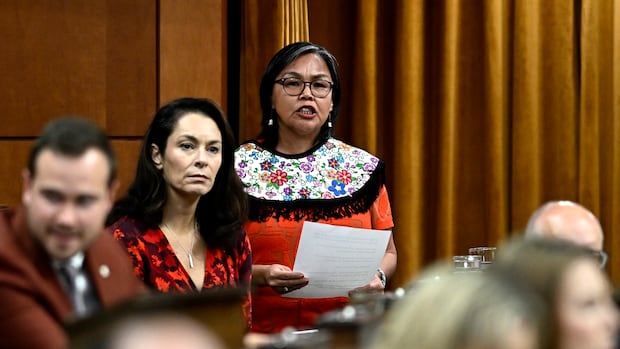IndigenousThe federal Liberal government’s Indigenous spending plan is rousing questions and debate about the potential impact of a two per cent budget cut alongside a lack of new money for core reconciliation programs.Indigenous Services minister defends 2% cut to department budgetBrett Forester · CBC News · Posted: Nov 06, 2025 4:28 PM EST | Last Updated: 3 hours agoListen to this articleEstimated 5 minutesThe audio version of this article is generated by text-to-speech, a technology based on artificial intelligence.NDP MP Lori Idlout rises during question period in the House of Commons on Parliament Hill in Ottawa on Sept. 27, 2024. (The Canadian Press/Justin Tang)In a buzzing House of Commons foyer on Wednesday, NDP MP Lori Idlout quietly explained how children are going hungry in her Nunavut riding as families grapple with an acute affordability crisis that, she said, will only worsen with federal spending cuts.”The Liberals’ political decisions are already having a devastating impact,” Idlout told CBC Indigenous.”For example, for no reason other than politics, when they decided to cancel the ICFI’s hamlet food voucher program, Inuit were placed back into poverty.”She was referring to the Inuit Child First Initiative, which in 2023 began providing Inuit communities with grocery vouchers in a territory where 79 per cent of children under 14 lived in food insecure households in 2022. The Liberal government ended the collective food voucher program in March, while the Inuit Child First Initiative itself, a so-called “sunset program,” has no guaranteed money past spring 2026. That’s prompting a warning of possible legal action from national organization Inuit Tapiriit Kanatami. I’m hearing daily reports from Nunavut that Inuit children are compelled to steal from grocery stores because they’re so hungry.- NDP MP Lori IdloutFamilies must now apply individually with proof of their dire need and often in their second language, Idlout said. Last week, her office learned through a written question that 24 Nunavut communities were approved for a total of nearly $90 million in food vouchers between 2023-2025, alleviating hunger for an estimated 15,000 Inuit children.”I’m hearing daily reports from Nunavut that Inuit children are compelled to steal from grocery stores because they’re so hungry,” the MP continued. “This — at a time when in this budget we saw investments to go towards mining companies to make it easier for them to exploit Indigenous peoples’ lands — is very concerning.”Idlout called out the Liberals directly after question period began Wednesday. As Crown-Indigenous Relations Minister Rebecca Alty stood to praise the budget for focusing on Indigenous youth, Idlout could be heard heckling that children are starving. Her reaction highlights a looming debate as Indigenous leaders and federal lawmakers weigh Prime Minister Mark Carney’s first budget, which in some places is both enticing and challenging for people like Idlout.On one hand, the Liberals promised to create a $1-billion Arctic Infrastructure Fund that could be a boon for the territory. Yet Carney’s budget left the future of several reconciliation-oriented social programs shrouded in uncertainty.Some Indigenous leaders welcomed the capping of the Indigenous departments’ budget cuts at two per cent instead of 15 per cent, but others cited persistent backlogs and delays, questioning how it’s possible to improve services with less money.Billed as efficienciesIn a phone interview, Indigenous Services Minister Mandy Gull-Masty suggested her department was braced for a bigger cut, so it should be able to meet the new target.”In the 15 per cent exercise, we were actually able to identify some duplications, some program service delivery that was not meeting the targets the way that the communities wanted,” she said. “So we’re able to go and find efficiencies in the system.”Minister of Indigenous Services Mandy Gull-Masty addresses a news conference in Ottawa on Oct. 29 as Finance Minister François-Philippe Champagne, right, looks on. (Spencer Colby/The Canadian Press)In regards to concerns about the Carney government terminating core reconciliation programs like ICFI, Gull-Masty said she’s being crystal clear with Indigenous leaders that these programs aren’t ending.”A lot of these programs, we want to modernize the delivery,” she said. “We want to ensure that the outcome really aligns with what the community is looking for. That means that those outcomes are based on their reality.”Idlout is not the only MP with questions.”The government always says they ‘need to consult.’ Who did they consult on cuts in ISC?” said Conservative MP and Indigenous Services critic Billy Morin in a statement to CBC Indigenous.Like Idlout, Morin criticized the budget’s Indigenous reconciliation chart, which listed mostly zeros for several key programs after this fiscal year.Billy Morin served as Enoch Cree Nation chief. He was elected for the Conservatives in 2025 federal election. (Manuel Carrillos/CBC)On Tuesday, Finance Minister François-Philippe Champagne touted his budget promise of “generational investment” by saying he is “often reminded of the seven-generation principle.”That principle is a teaching among some First Nations promoting responsible stewardship to ensure a sustainable future for generations to come. Morin, a former chief of Enoch Cree Nation in Alberta, denounced the reference as an insult.”Using this teaching is a slap in the face to Indigenous peoples,” he said.”This chart shows zero commitment for these services to Indigenous communities, many in crisis. How can he claim to use the Indigenous seven generation teaching?”Asked about that chart, Gull-Masty said “those are zero because we need to define and build what that’s going to look like.”In Parliament, the situation is now one of high-stakes political brinkmanship as the minority Liberals work to get the spending plan passed. Idlout said she was undecided about which way to vote, saying she needs to consult further with Indigenous leaders and other stakeholders.ABOUT THE AUTHORBrett Forester is a reporter with CBC Indigenous in Ottawa. He is a member of the Chippewas of Kettle and Stony Point First Nation in southern Ontario who previously worked as a journalist with the Aboriginal Peoples Television Network.
Friday, 6 Feb 2026
Canada – The Illusion
Search
Have an existing account?
Sign In
© 2022 Foxiz News Network. Ruby Design Company. All Rights Reserved.
You May also Like
- More News:
- history
- Standing Bear Network
- John Gonzalez
- ᐊᔭᐦᑊ ayahp — It happened
- Creation
- Beneath the Water
- Olympic gold medal
- Jim Thorpe
- type O blood
- the bringer of life
- Raven
- Wás’agi
- NoiseCat
- 'Sugarcane'
- The rivers still sing
- ᑲᓂᐸᐏᐟ ᒪᐢᑿ
- ᐅᑳᐤ okâw — We remember
- ᐊᓂᓈᐯᐃᐧᐣ aninâpêwin — Truth
- This is what it means to be human.
- Nokoma











